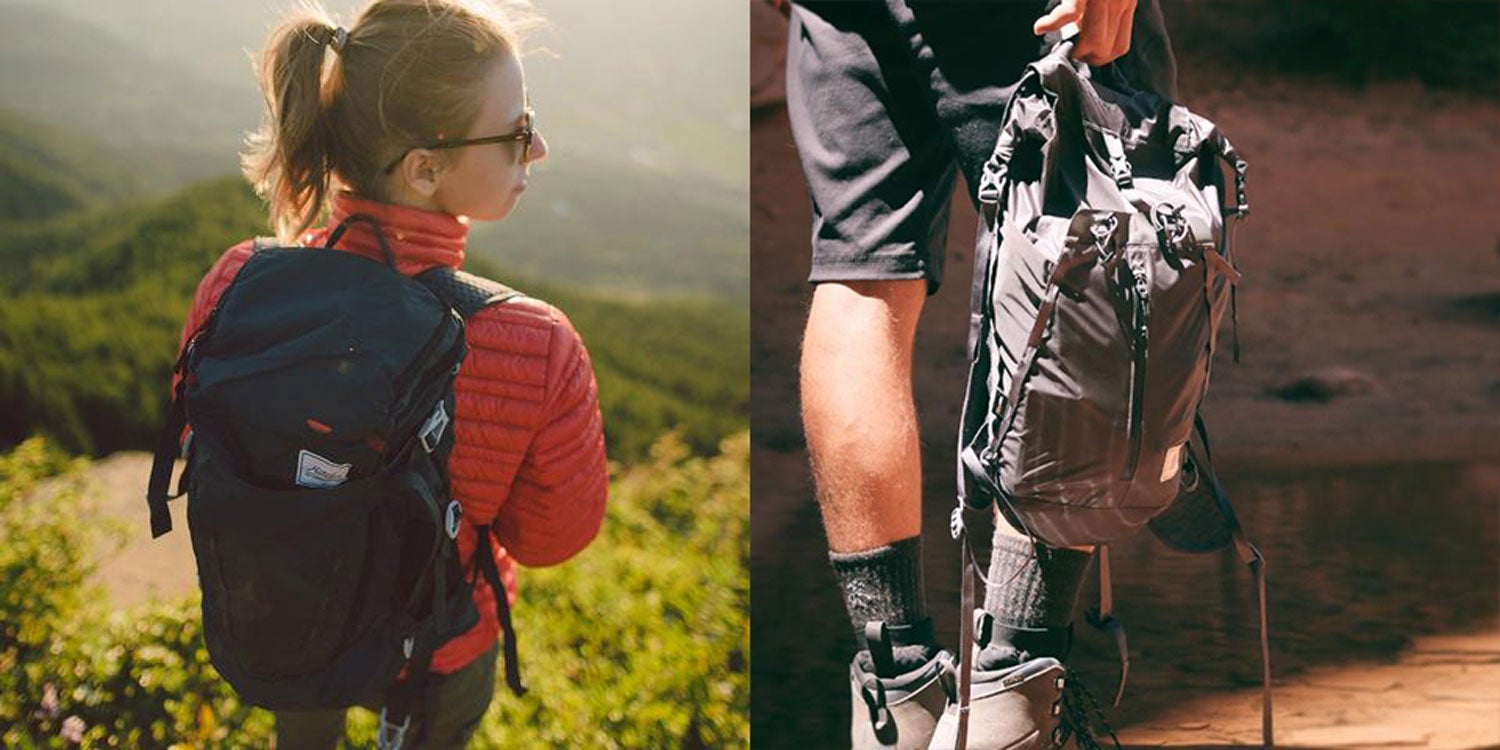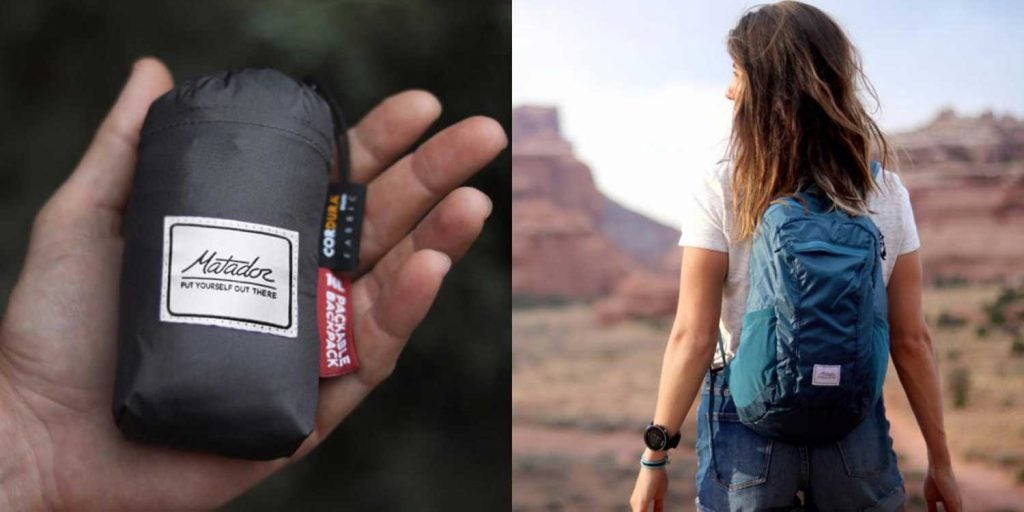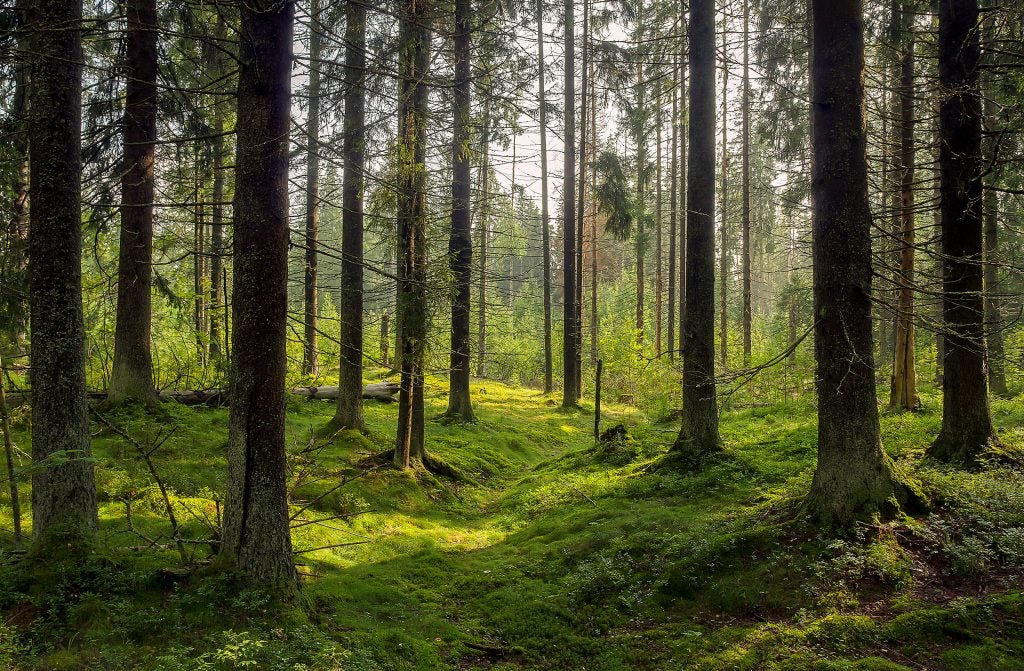This article is brought to you by our friends at Matador—creator of packable backpacks. Their camping backpack is perfect for the campsite, the trail, and bebopping around town.
Remember the first time you got a new backpack? It might have been first grade when you begged your parents for the new Lion King themed backpack – that wasn’t just us, right? You packed it full of books and your lunch bag, pulled the straps snug, and took off for school. With your new pack secured, you were ready to tackle the day.
Fortunately for all of us, the adventure doesn’t stop in grade school.
Adults can relive the back-to-school wardrobe excitement with backpacks for all kinds of activities, our favorite being — you guessed it, camping! We would argue that a backpack is one of the most important pieces of gear for the outdoors, and the most important if you’re going on a backpacking trip.
These days, the camping backpack comes in all different shapes and sizes. But how do you choose when you can no longer base your purchase on the latest Disney movie? (Or maybe you can. No Judgement.)
No matter what your adventure, we’ve got you covered with a breakdown of the perfect camping backpack:
What to Look for in a Camping Backpack
Outdoor backpacks come in many different sizes that range depending on the activity and the length of trip. Typically, you want to carry the least amount of weight possible without skimping on necessities. Capacity will often depend on what you’re comfortable carrying, and the conditions of your camping or backpacking trip.
For the Day Hiker
For a day of hiking, you will want to bring something light since you only need to pack food, water, a small first aid kit, and maybe a few layers. Daypacks typically range from 10 liters to 35 liters; some of which have bladders for hydration. Daypacks don’t require the many different features you’ll find on bigger backpacking packs — you want to keep it simple.
With a short day hike, a simple hydration backpack can serve all your needs. If the technical look isn’t your thing, an eco-friendly backpack can be perfect for work and for the trail.
For the Weekend Warrior
Are you craving serious wilderness time but limited by the two days at the end of the week? That might be a logistical challenge — especially if you’re looking to venture far from home. But it’s totally manageable from a gear standpoint. Since you can’t use a daypack for an overnight trip, you’re going to want to get something a little bigger.
A weekend camping backpack is ideal for 1-3 nights in the woods. Depending on the conditions you plan to camp in, a weekend pack should be somewhere between 35 and 50 liters in capacity. More gear needs more space, and for a weekend trip, you’ll need to pack a sleeping bag, sleeping pad, tent, camping stove, and food.
For the Multi-Day Backpacker
When it comes to backpacking, the biggest difference between a weekend trip and a multi-day trip comes down to the amount of food you need to pack and the activities you might have planned. For example, if you’re embarking on a four-day backpacking and fly fishing trip, you’re going to need extra room in your pack for fishing gear.
Multi-day backing trips are estimated at about 3-5 nights. The ideal pack size for these types of journeys will be between 50 and 70 liters. An outdoor backpack of this size will enable you to pack the extra food, layers, and gear you need to enjoy a multi-day trip into the mountains, desert, or whatever landscape is calling your name.
For The Expeditioner
If you plan to stay in the wilderness for more than five nights, then you will embark on a expedition that demands a pretty hefty backpack.
Depending on your style of wilderness exploring, you may want to keep your belongings to a minimum. Some people thru-hike for weeks with just a 5oL pack. The smaller the pack, the lighter the load.
That being said, expedition packs can range up to 70L or more, so you can carry gear for many nights and a variety of activities if you so choose.
Packs of this size are good for winter backpacking trips, as thick layers take up a lot more room. They can also be used for family backpacking trips, especially if your children are not old enough to carry their own packs yet. Expedition backpacks are also used for guided mountaineering journeys, so if summiting Denali is on your adventure list, you might want to consider a big one.
The Dyrt is the only camping app with all of the public and private campgrounds, RV parks, and free camping locations in the United States. Download now for iOS and Android.Popular Articles:
Articles on The Dyrt Magazine may contain links to affiliate websites. The Dyrt receives an affiliate commission for any purchases made by using such links at no additional cost to you the consumer.



